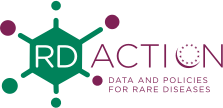Austria
Visual Recap
Contributor‘s names
Summary of Rare Disease Activities in Austria*
(Full report accessible below)
Austria formally adopted the European Commission definition of a rare disease when it approved a National Plan for Rare Diseases in February 2015. The NP was developed by the National Coordination Centre for RD (CCRD) which was established by the MoH in April of 2011. The CCRD works closely with two committees established to support its operations: the Expert Committee on RD (which has a very strong multistakeholder composition), and the Strategic Platform (which represents policy-makers from the health and social care systems). The final NP draft is being implemented by the Expert Committee, via the CCRD (which meets twice per year. The NP has resulted in several successes to-date, including the development of a formal designation process for CEs (two CEs have been formally approved under Austria’s (more specific) process, with 30 CEs complying with the EUCERD criteria). In terms of ERN involvement, Austria coordinates the ERN for Paediatric Cancer. There is no national registry at present, and the majority of the registries for individual or groups of diseases are clinician led.
Austrian laboratories offer testing for 745 diseases and 703 genes (excluding panels). Genetic testing abroad is possible if a test is strongly indicated for an individual patient and cannot be performed within the country (or else can only be performed with difficulty). In such cases, prior authorization by the insurance agency (private practice) or the hospital director is obligatory. Austria’s NBS programme tests almost all newborns for 24 inherited metabolic and endocrine diseases (an official body overseeing NBS is foreseen in time, under the NP). There are no national helplines for RD in Austria but the CCRD constitutes an official information centre. There is no specific funding programme/stream for RD research; instead, Austria follows a bottom-up approach where the quality of proposal is the sole criterion, rare-focused or otherwise. Austria does participate in E-RARE. 91 OMPs are available in Austria, either priced and reimbursed through insurance companies or else directly provided by the health system. Compassionate use programmes are available to facilitate access to certain OMPs and if an OMP is not on the national reimbursement scheme, the product can still be reimbursed if its use can be justified as essential.
Full 2016 Report on Rare Disease Activities in Austria
*NB – The findings and conclusions in this report are those of the contributors and validating authorities, who are responsible for the contents; the findings and conclusions do not necessarily represent the views of the European Commission or national health authorities in Europe. Therefore, no statement in this report should be construed as an official position of the European Commission or a national health authority
Information supplied by the Austrian SOA Data Contributing Committee:
- Competent National Authority – Till Voigtländer
- Orphanet National Representative – Ursula Unterberger
- National Patient Alliance Representative – Ulrike Holzer





























